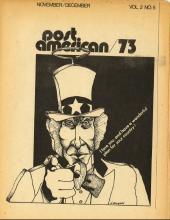Last year in France, Kennecott Copper brought legal suit against the government of Chile in relation to the nationalization of their El Teniente copper mine. In a summation before the French Court, Kennecott lawyers acknowledged that their actions were an exercise in “teaching Chile the political realities of life.” On 11 September 1973, the world watched as Chile learned its lessons well.
On that morning the Chilean Navy seized control of the important port city of Valparaiso and broadcast a demand “that the President of the republic must proceed immediately to hand over his high office to the Chilean armed forces and police.” President Salvador Allende Gossens quickly left for the presidential palace, La Moneda, to repel the second military attempt at coup d’état in four months. From the beginning this one looked more serious. He told his wife over the phone that “there’s an uprising of the navy and many riots in Santiago. I don’t know whether we can resist or not. These are very difficult moments. Let’s hope we come out all right.” As the crisis deepened, Allende increased his determination to see it through to the end. In his public statement, made by radio as two airforce jets screamed over La Moneda, Allende said: “I will not resign. I will not do it. I am ready to resist with whatever means, even at the cost of my life in that this serves as a lesson in the ignominious history of those who have strength, but not reason.”
Read the Full Article

